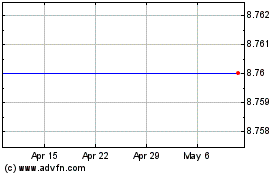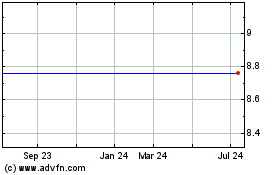Preventable Errors' Led to 2015 California Oil Spill, Regulators Say
May 19 2016 - 6:50PM
Dow Jones News
Plains All American Pipeline LP failed to prevent a massive oil
spill in California last year and its delayed response compounded
the severity of the accident, federal regulators said Thursday.
The corroded oil pipeline, which moved crude along scenic
Highway 1, broke open a year ago and spilled nearly 3,000 barrelsÂ
of oil onto a beach and into the Pacific Ocean near Santa
Barbara.
Anthony Foxx, U.S. Transportation Secretary, said the
investigation revealed that "a number of preventable errors led to
this incident, and that the company's failures in judgment,
including inadequate assessment of the safety of this line and
faulty planning made matters worse."
Plains said it is reviewing the report from the Pipeline and
Hazardous Materials Safety Administration, which is a part of the
Transportation Department, and wouldn't comment on it because of
pending litigation.
Earlier this week the California Attorney General announced that
a grand jury indicted the company on 46 counts related to the oil
spill, four of them felonies. A Plains employee was also charged.
Plains said the charges are meritless and the company will fight
them.
The report, released exactly one year after the Plains oil
spill, underscores the limitations of pipeline inspection tools and
monitoring systems that energy companies say prevent leaks.
In the report, federal regulators said Plains didn't work hard
enough to spot problems on its pipeline in advance of the spill.
The report also said that Houston-based Plains didn't have adequate
procedures and systems in place to keep such a spill from
escalating into an emergency.
"Since the release, we have worked tirelessly and relentlessly
to do the right thing and do it as quickly and effectively as
possible by cleaning up the beaches and other affected areas,
compensating those who were impacted by the release and working
with the various governmental and other organizations responding to
the incident," the company said in a written statement
Thursday.
Now that PHMSA has concluded its investigation, the agency will
focus on possible enforcement actions, and could impose civil
penalties or refer the case for federal criminal prosecution.
"What happened is completely unacceptable and we will hold the
company accountable for its actions," said Marie Therese Dominguez,
PHMSA Administrator.
Federal regulators previously said the immediate cause of the
spill was corrosion that thinned the walls of the pipeline. Plains
had inspected the line, but when the broken pipe was excavated
investigators found significantly worse corrosion than the testing
predicted.
Today's report said Plains didn't properly analyze inspection
results and would have had a better chance of early detection with
a different inspection tool.
The report also said the company's leak detection system wasn't
sensitive enough to alert control-room staff quickly when the
pipeline broke, and operators didn't recognize that the pipe was
leaking. An operator in the control room, who was dealing with
another problem on the pipeline, inhibited an alarm that would have
given earlier notice of the catastrophic failure.
Write to Alison Sider at alison.sider@wsj.com
(END) Dow Jones Newswires
May 19, 2016 18:35 ET (22:35 GMT)
Copyright (c) 2016 Dow Jones & Company, Inc.
Plains All American Pipe... (NYSE:PAA)
Historical Stock Chart
From Aug 2024 to Sep 2024

Plains All American Pipe... (NYSE:PAA)
Historical Stock Chart
From Sep 2023 to Sep 2024
